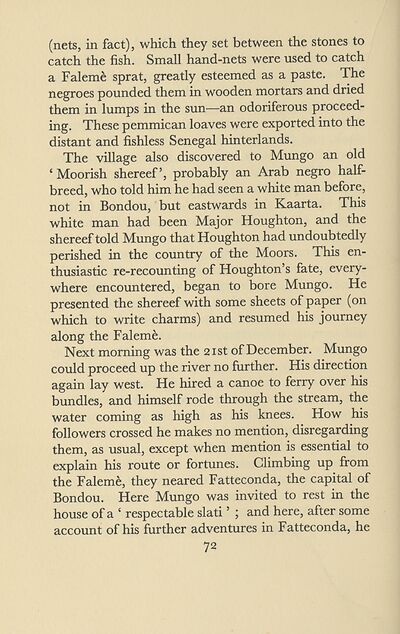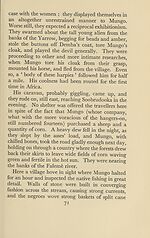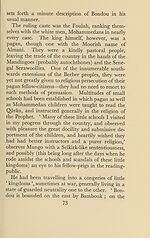Niger
(78)
Download files
Complete book:
Individual page:
Thumbnail gallery: Grid view | List view

(nets, in fact), which they set between the stones to
catch the fish. Small hand-nets were used to catch
a Faleme sprat, greatly esteemed as a paste. The
negroes pounded them in wooden mortars and dried
them in lumps in the sun—an odoriferous proceed¬
ing. These pemmican loaves were exported into the
distant and fishless Senegal hinterlands.
The village also discovered to Mungo an old
c Moorish shereef’, probably an Arab negro half-
breed, who told him he had seen a white man before,
not in Bondou, but eastwards in Kaarta. This
white man had been Major Houghton, and the
shereef told Mungo that Houghton had undoubtedly
perished in the country of the Moors. This en¬
thusiastic re-recounting of Houghton’s fate, every¬
where encountered, began to bore Mungo. He
presented the shereef with some sheets of paper (on
which to write charms) and resumed his journey
along the Faleme.
Next morning was the 21st of December. Mungo
could proceed up the river no further. His direction
again lay west. He hired a canoe to ferry over his
bundles, and himself rode through the stream, the
water coming as high as his knees. How his
followers crossed he makes no mention, disregarding
them, as usual, except when mention is essential to
explain his route or fortunes. Climbing up from
the Faleme, they neared Fatteconda, the capital of
Bondou. Here Mungo was invited to rest in the
house of a < respectable slati ’ ; and here, after some
account of his further adventures in Fatteconda, he
72
catch the fish. Small hand-nets were used to catch
a Faleme sprat, greatly esteemed as a paste. The
negroes pounded them in wooden mortars and dried
them in lumps in the sun—an odoriferous proceed¬
ing. These pemmican loaves were exported into the
distant and fishless Senegal hinterlands.
The village also discovered to Mungo an old
c Moorish shereef’, probably an Arab negro half-
breed, who told him he had seen a white man before,
not in Bondou, but eastwards in Kaarta. This
white man had been Major Houghton, and the
shereef told Mungo that Houghton had undoubtedly
perished in the country of the Moors. This en¬
thusiastic re-recounting of Houghton’s fate, every¬
where encountered, began to bore Mungo. He
presented the shereef with some sheets of paper (on
which to write charms) and resumed his journey
along the Faleme.
Next morning was the 21st of December. Mungo
could proceed up the river no further. His direction
again lay west. He hired a canoe to ferry over his
bundles, and himself rode through the stream, the
water coming as high as his knees. How his
followers crossed he makes no mention, disregarding
them, as usual, except when mention is essential to
explain his route or fortunes. Climbing up from
the Faleme, they neared Fatteconda, the capital of
Bondou. Here Mungo was invited to rest in the
house of a < respectable slati ’ ; and here, after some
account of his further adventures in Fatteconda, he
72
Set display mode to:
![]() Universal Viewer |
Universal Viewer | ![]() Mirador |
Large image | Transcription
Mirador |
Large image | Transcription
Images and transcriptions on this page, including medium image downloads, may be used under the Creative Commons Attribution 4.0 International Licence unless otherwise stated. ![]()
| The books of Lewis Grassic Gibbon > Niger > (78) |
|---|
| Permanent URL | https://digital.nls.uk/205175278 |
|---|
| Description | Sixteen books written by Lewis Grassic Gibbon (1901-1935), regarded as the most important Scottish prose writer of the early 20th century. All were published in the last seven years of his life, mostly under his real name, James Leslie Mitchell. They include two works of science fiction, non-fiction works on exploration, short stories set in Egypt, a novel about Spartacus, and the classic 'Scots Quair' trilogy which includes 'Sunset Song'. Mitchell's first book 'Hanno, or the future of exploration' (1928) is rare and has never been republished. |
|---|---|
| Additional NLS resources: |
|

